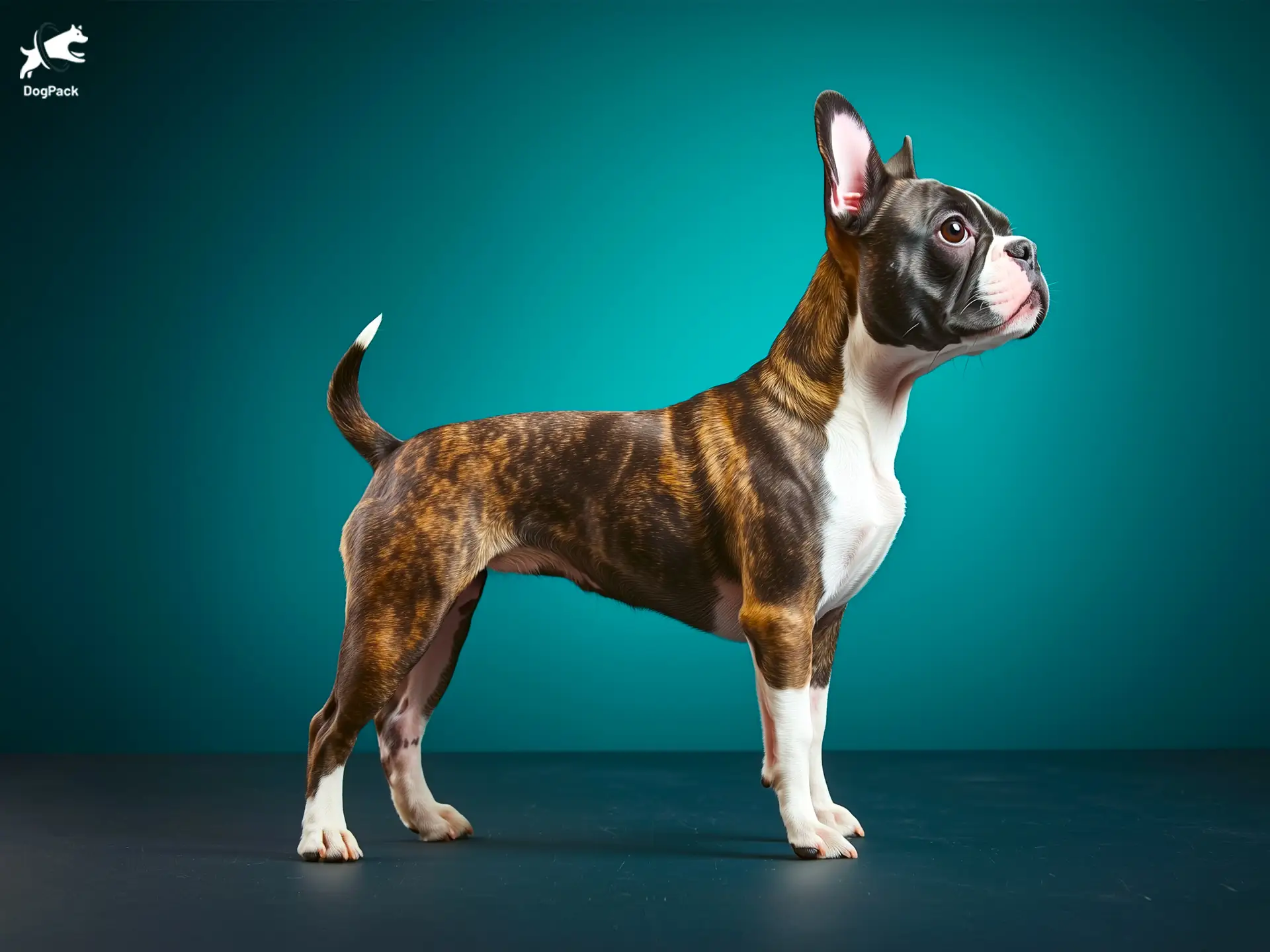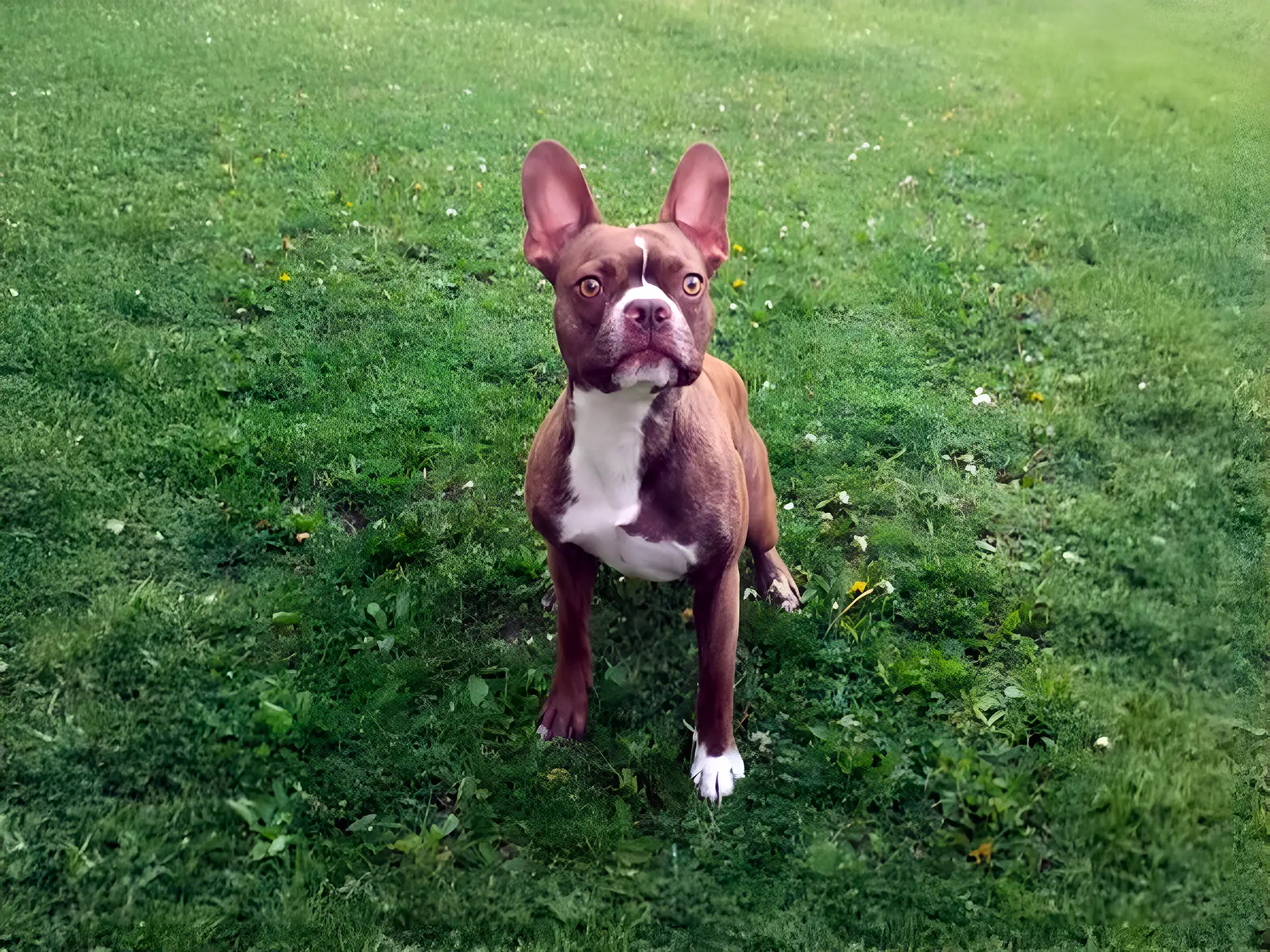Frenchton Dog Breed Info & Overview
The Frenchton, a delightful mix of the playful Boston Terrier and the affectionate French Bulldog, is a small dog bursting with charm and energy. Known for their friendly nature and adaptability, Frenchtons make wonderful companions for families, singles, and seniors alike. With their compact size and moderate exercise needs, they’re perfectly suited for apartment living, bringing joy and warmth to any home.
Characteristics
Pictures
Breed History
The Frenchton is a modern hybrid, originating in the United States during the late 1990s. This breed was created by crossing the French Bulldog with the Boston Terrier, combining the charm of the Frenchie with the Boston’s lively personality. The goal was to develop a healthier and more adaptable companion dog.
By blending these two iconic breeds, breeders aimed to reduce the French Bulldog’s respiratory challenges while maintaining its affectionate temperament. The result was a delightful hybrid that quickly gained popularity for its balanced traits and playful nature.
Although the Frenchton isn’t recognized by major kennel clubs, its unique qualities and growing fan base have made it a standout among designer breeds. Their increasing presence in homes highlights the appeal of their lovable personalities and adaptable nature.
Temperament, Personality
Frenchtons are affectionate, sociable dogs that thrive on human companionship. They form strong bonds with their families and are happiest when included in daily activities. Their friendly and playful demeanor makes them great companions for people of all ages.
Combining the French Bulldog’s laid-back attitude with the Boston Terrier’s energetic spirit, Frenchtons strike a balance between being active playmates and cuddle enthusiasts. They’re adaptable, making them suitable for both busy households and quieter lifestyles.
Although generally friendly with strangers and other pets, early socialization is essential to ensure good manners and confidence. With their intelligence and eagerness to please, training a Frenchton is an enjoyable experience that strengthens your bond.
Physical Characteristics
Frenchtons are compact, muscular dogs, typically standing 11 to 15 inches tall and weighing 15 to 25 pounds. They inherit a mix of physical traits from their parent breeds, often sporting a sturdy build and a charmingly expressive face.
Their coats are short and smooth, coming in a variety of colors like brindle, black, white, and fawn. Some may feature Boston Terrier-like markings, adding to their unique appeal. The Frenchton’s ears can range from bat-like to semi-floppy, creating an endearing look.
Their snouts are slightly longer than a French Bulldog’s, which helps alleviate some respiratory issues. Combined with their wide-set eyes and perky demeanor, Frenchtons exude a playful charm that’s hard to resist.
Health Issues
Frenchtons are generally healthier than their purebred parents, but they may still inherit certain health issues. Common concerns include brachycephalic syndrome, which affects breathing, particularly in hot or humid conditions. Monitoring their activity during warmer weather is crucial.
Other potential health issues include patellar luxation, hip dysplasia, and eye conditions such as cataracts or cherry eye. Routine vet check-ups can help identify and address these concerns early. Maintaining a healthy weight is essential to prevent joint and respiratory stress.
Proper care and attention can help your Frenchton lead a happy, active life. A balanced diet, regular exercise, and preventive veterinary care are key to minimizing health risks and promoting their overall well-being.
Grooming Needs
Frenchtons are low-maintenance when it comes to grooming. Their short coats only require weekly brushing to remove loose hair and keep their fur sleek and shiny. They are moderate shedders, and regular grooming can help manage shedding.
Bathing should be done monthly or as needed, using a gentle dog shampoo to avoid skin irritation. If your Frenchton inherits facial wrinkles, these areas should be cleaned and dried thoroughly to prevent moisture buildup and potential infections.
Routine dental care, including brushing their teeth several times a week, helps prevent tartar buildup and gum disease. Additionally, regular nail trimming and ear cleaning are important parts of their grooming routine, ensuring they remain comfortable and healthy.
Exercise Requirements
Frenchtons have moderate energy levels and require daily exercise to stay fit and mentally stimulated. About 30 to 45 minutes of activity per day, such as walks, playtime, or interactive games, is typically sufficient to meet their needs.
Due to their brachycephalic nature, avoid intense exercise, especially in extreme heat or humidity, as this can lead to breathing difficulties. Short bursts of play, followed by periods of rest, work best for this breed.
Mental stimulation is equally important. Puzzle toys, obedience training, and scent-based games can keep their minds sharp and help prevent boredom. Their adaptable nature makes them well-suited for both active homes and quieter lifestyles.
Training Tips
Training a Frenchton is a rewarding experience, as they are intelligent and eager to please. Positive reinforcement techniques, such as treats, praise, and play, work best to encourage good behavior and strengthen your bond.
Consistency is key when training a Frenchton. They respond well to clear commands and routines. Keep sessions short and engaging to hold their attention, as they may inherit a slight stubborn streak from the French Bulldog side.
Socialization from an early age helps them develop confidence and good manners. Expose them to various environments, people, and other animals to prevent anxiety or fearfulness. With patience and dedication, your Frenchton will thrive as a well-mannered companion.
Nutrition, Diet
Frenchtons require a balanced diet tailored to their size, age, and activity level. On average, they need about 1 to 1.5 cups of high-quality dry kibble per day, divided into two meals. Opt for formulas designed for small breeds to meet their nutritional needs.
Monitor their calorie intake to prevent obesity, as excess weight can exacerbate respiratory and joint issues. Treats should be given sparingly and primarily used as rewards during training sessions.
Some Frenchtons may benefit from diets with added omega-3 fatty acids to promote skin and coat health. Always consult your veterinarian for personalized dietary recommendations to ensure your Frenchton stays healthy and active.
Adoption, Breeders
When considering a Frenchton, start by researching reputable breeders who prioritize health and temperament. Look for breeders who provide health clearances for both parent breeds and are transparent about their breeding practices.
Adoption is another great option. Rescue organizations and shelters may occasionally have Frenchtons or similar mixes available. Communities like Frenchton Lovers or websites like Petfinder and Adopt-a-Pet can help you locate adoptable Frenchtons in your area.
Avoid puppy mills and unethical breeders, as these sources often neglect the well-being of their dogs. Taking the time to find a responsible breeder or adoption agency ensures you bring home a happy, healthy Frenchton.
Family Pet?
Frenchtons make wonderful family pets, thanks to their affectionate and adaptable nature. They are great with children, providing endless entertainment and gentle companionship. Their playful energy makes them excellent playmates for kids of all ages.
With proper socialization, Frenchtons get along well with other pets, including dogs and cats. Their sociable demeanor ensures they integrate smoothly into multi-pet households, creating a harmonious environment.
Their compact size and moderate exercise needs make them suitable for both apartments and larger homes. Frenchtons thrive on attention and love being part of family activities, making them a cherished member of any household.
Right For You?
If you’re looking for a small, affectionate dog that adapts well to various lifestyles, the Frenchton could be the perfect match. They are ideal for families, singles, and seniors, thanks to their friendly demeanor and moderate exercise requirements.
Frenchtons do best in homes where they receive plenty of attention and aren’t left alone for long periods. Their need for companionship makes them unsuitable for owners with frequent, extended absences.
With their low grooming needs and adaptable nature, Frenchtons are an excellent choice for first-time dog owners. If you’re prepared to meet their social and physical needs, they’ll reward you with loyalty, love, and endless charm.
Conclusion
The Frenchton is a delightful blend of the French Bulldog and Boston Terrier, offering the best of both worlds. With their playful spirit, affectionate nature, and adaptable size, they make fantastic companions for a wide range of households. Whether you’re a city dweller or a suburban family, the Frenchton’s loving personality is sure to bring joy and laughter into your home for years to come.
FAQs
-
Can Frenchtons handle living in colder climates?
Frenchtons have short coats and minimal body fat, making them sensitive to cold weather. They may require a dog sweater or jacket during winter walks and should avoid prolonged exposure to low temperatures.
-
Do Frenchtons have any unique quirks in their behavior?
Frenchtons often exhibit a mix of the playful energy of Boston Terriers and the stubborn charm of French Bulldogs. They are known for their expressive faces and tendency to “talk” through grumbles and snorts, which owners find endearing.
-
How do Frenchtons interact with older family members?
Frenchtons are gentle and attentive, making them excellent companions for seniors. Their manageable size and moderate activity levels ensure they’re easy to handle, and they often form strong bonds with older family members.
-
Are Frenchtons known for being escape artists?
While not typically escape artists, Frenchtons can inherit curiosity from their Boston Terrier lineage. They may dig under fences or explore gaps if left unsupervised. A secure yard is essential for their safety.
-
What are some lesser-known health considerations for Frenchtons?
Beyond breathing issues, Frenchtons may develop dental crowding due to their compact jaw. Regular dental check-ups and appropriate chew toys are essential to maintain oral health and prevent discomfort.
Breed Ratings
Frenchtons are smart and quick to learn, especially when motivated with positive reinforcement and treats.
This breed loves to play and enjoys interactive games, making them fun companions for both kids and adults.
With moderate energy, Frenchtons need daily walks and playtime but are also content to relax indoors.
They shed minimally to moderately, and regular brushing can help manage loose hair.
Frenchtons have a low prey drive but may occasionally chase small animals if not trained otherwise.
Their short coat requires minimal grooming, making them relatively easy to care for in this aspect.
Eager to please and intelligent, Frenchtons respond well to consistent, positive training methods.
They prefer companionship and may not tolerate being alone for long periods without proper training.
Frenchtons are moderate barkers and may alert you to strangers but are not excessively vocal.
They may drool occasionally, especially during hot weather or after exercise, but it’s generally minimal.
With proper socialization, Frenchtons get along well with other dogs and enjoy canine companionship.
While healthier than some purebreds, they can still have health issues like respiratory problems; regular vet care is important.














